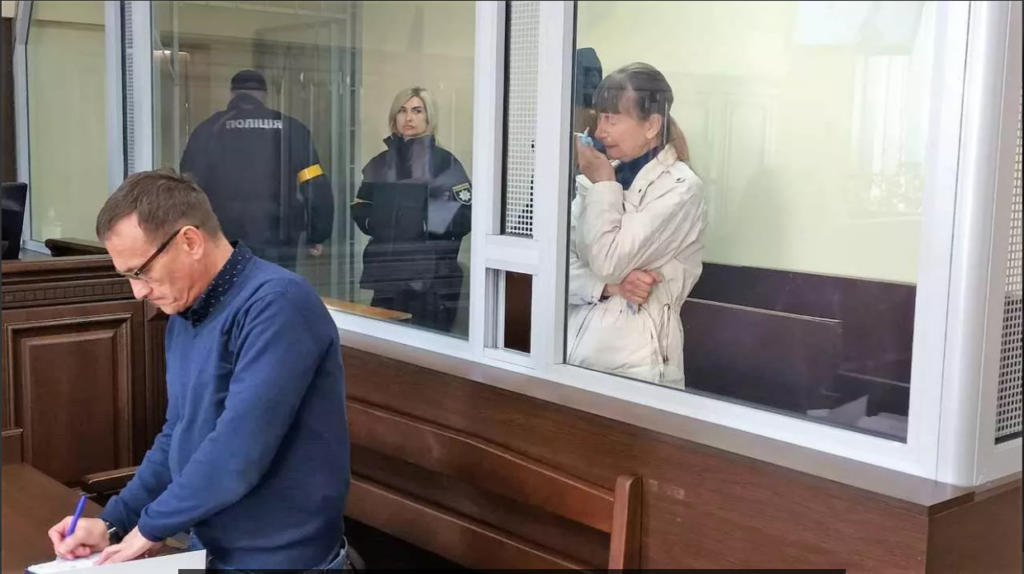On February 24, 2022, a resident of Cherkasy, Tatiana Drobot, liked a post on the social network Odnoklassniki (Classmates) about the raising of the Russian flag over the city of Kakhovka in the Kherson region. The post read: “The city of Kakhovka, Kherson region. The Russian flag is being raised over the city administration for the duration of the special military operation for the denazification of Ukraine.” Following this, she was subjected to a search under Article 110 of the Criminal Code of Ukraine, “Encroachment on the territorial integrity of Ukraine.” There were clearly no legal grounds for this, as the criminal offense under this article consists of “calls” for a change in territorial integrity, which, firstly, cannot be a simple “like,” and secondly, the liked message itself did not contain any such calls but rather presented a factual news report.
During the search, SBU officers discovered photographs in Tetiana’s private Viber messages with her sister in Russia, showing what were described as “fortification structures in central Cherkasy” with Tetiana’s caption: “They’ll bomb it, so it shouldn’t be here.” The prosecution argues that Drobot passed these photos to “representatives of the Russian Federation” with the aim of “weakening Ukraine’s defense capabilities.” However, the accusation fails to explain who these “representatives of the Russian Federation” are, and presents no evidence linking her sister to any Russian state bodies. The only evidence is Tatiana’s own testimony. According to her, on March 4, 2022 (after the search), her husband, passing by the former House of Officers in Cherkasy, noticed that a military unit had been established there, with a checkpoint constructed from concrete blocks and sandbags. He photographed this and sent the pictures to his wife’s tablet. She then forwarded them to her sister in Russia.
While new Ukrainian legislation prohibits taking and sending such photographs, as they were sent only to her sister, and the SBU presented no evidence linking her sister to the Russian Armed Forces, the FSB, or any other Russian state structure, the case could only concern Article 114-2 of the Ukrainian Criminal Code – “Unauthorized dissemination of information about the direction, movement of weapons, armaments and ammunition to Ukraine, the movement, relocation or deployment of the Armed Forces of Ukraine or other military formations in accordance with the laws of Ukraine, committed under martial law or a state of emergency.” This is a serious charge – carrying a sentence of 5 to 8 years – but still not treason, which carries a sentence of 10 to 15 years. No linguistic expert could interpret the caption “They’ll bomb it, so it shouldn’t be here” as a call to attack Ukrainian forces; it was a private assessment to her sister, suggesting that the Russian army might attack those positions. However, an expert from Cherkasy Bohdan Khmelnytskyi National University, in an expert opinion dated March 14, 2022, stated that the post’s content “indicates calls and incitement of Odnoklassniki users to recognize changes in the borders of territories or the state border of Ukraine,” raising doubts about the expert’s impartiality. Furthermore, there is no evidence in the case that the checkpoint was ever attacked.

Tatiana admitted to liking the post and sending the photos to her sister, but claimed she did so “unconsciously” and “in the heat of the moment,” and that her actions had nothing to do with passing information to Russian special services.
“Without realizing it, I sent these photos to my sister because my sister met her future husband here. We used to come here for clubs. It was a place of social gathering,” the defendant explained.
Some Ukrainian media outlets acknowledged that for “anti-Ukrainian slogans” and “Russian propaganda,” Tatiana would at most have faced a suspended sentence, according to established practice. However, other media outlets labeled her a “collaborator,” a “spotter,” who “called on the Russians to bomb Cherkasy,” none of which is supported by the case file. Nevertheless, Tatiana Drobot was charged under Articles 110 (encroachment on territorial integrity) and 111 (treason) of the Criminal Code and sent to pre-trial detention with the option of posting an unaffordable bail of 1 million hryvnias.
On October 18, 2022, Tatiana Drobot was sentenced to 5 years imprisonment for liking the news about the Russian flag over Kakhovka (as encroachment on Ukraine’s territorial integrity) and to 10 years imprisonment for sending her sister photos of barricades in central Cherkasy (as treason).
The lawyer appealed, citing the incompleteness of the judicial investigation, leading to a disproportionate sentence, and requested a reduction to 8 years. The prosecutor had requested 8 years, but the court imposed 10 without stating its reasons for disagreeing with the prosecutor’s recommendation, thus effectively assuming the role of the prosecution. The appeal court rejected the appeal but remanded the case back to the court of first instance because the verdict did not meet the criteria of legality – it lacked the required precise indication of the place, time, method of committing the crime, its consequences (which were absent), the form of guilt, and motives. The appeal court considered that the lower court failed to state the formulation of the charge it deemed proven, only listing the circumstances of the offense Drobot was accused of. This meant the appeal court could not determine which factual circumstances the lower court had found proven, and therefore had nothing to consider.
On the retrial, the court again proceeded in a simplified manner, limiting itself to questioning the defendant, and again sentenced her to 10 years imprisonment.


